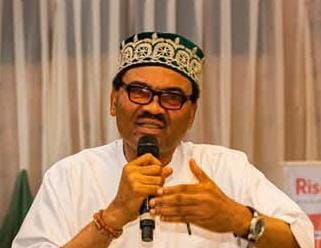As the November 2025 Anambra Governorship Election draws near, community leaderships in the state have been advised to remain neutral and shun the open endorsement of candidates vying in the election.
The advice came from a Citizen advocate, and President, International Peace and Civic Responsibility Centre (IPCRC), Prince Chris Azor, in an exclusive chat with The News Chronicle’ correspondent in Awka.
Recent campaigns in the state have seen local government authorities and town union leaderships presenting hundreds of millions to various candidates in open endorsement of their ambitions.
Traditional rulers are not left out in the fray, as they have also openly conferred chieftaincy titles to some candidates, reflecting their endorsement of their candidacies.
According to Azor, it is a worrisome trend that communities, town unions, and traditional councils are openly endorsing candidates, organizing campaign rallies, and donating funds and vehicles to political aspirants.
He noted that while these gestures may appear as expressions of solidarity or gratitude, they are inconsistent with the Nigerian Constitution, the Electoral Act, and the ethical responsibilities of nonpartisan community institutions.
“The 1999 Constitution of the Federal Republic of Nigeria (as amended) makes it abundantly clear that only Political Parties may canvass for votes or contribute to campaign funding.
Section 221 explicitly provides that ‘no association other than a political party shall canvass for votes for any candidate at any election or contribute to the funds of any Political Party or to the election expenses of any candidate at an election.’
This provision leaves no room for Communities, Associations, or Traditional Institutions to endorse or financially support political candidates publicly.
“Similarly, the Electoral Act, 2022 reinforces this constitutional principle. Section 83(1) states that only Political Parties may hold or sponsor public rallies in relation to elections, while Section 88(8) places strict limits on contributions and donations to Candidates and Parties to prevent undue influence and corruption.
Section 225(3) of the Constitution further mandates that Parties must declare the sources of their funds, ensuring transparency and accountability in political financing,” he noted.
Azor maintained that when communities or traditional institutions align themselves with a particular political interest, they violate not only the law but also the social contract that binds them to serve all citizens equally.
According to him, communities must be neutral platforms for peace, civic enlightenment, and collective development, not instruments for partisan mobilization, adding that public donations and endorsements compromise this neutrality, divide the people, and deepen social and political fault lines.
He said, “Beyond legal infractions, such actions carry serious moral and security implications. History shows that community-level partisanship often breeds factional disputes, political violence, and post-election animosity.
When one faction of a town or age group supports a candidate, others feel alienated, leading to tension, intolerance, and conflict. This is a dangerous pattern that undermines social harmony and the credibility of traditional leadership.
“Moreover, communal or group donations erode the integrity of electoral financing and entrench money politics. It creates a cycle where candidates feel indebted to communities or individuals, promoting quid-pro-quo governance and weakening public accountability.
The people’s mandate should never be traded for gifts, promises, or collective endorsements. Democracy flourishes only when voters act as free citizens guided by conscience and informed judgment, not as subjects following communal dictates.”
Azor advised communities to refrain from partisanship and channel their energy toward promoting peaceful elections, civic education, and voter participation.
He beckoned on traditional rulers to adhere strictly to their codes of conduct, remaining nonpartisan symbols of unity and custodians of peace, urging political parties and candidates to desist from soliciting Community endorsements or donations that contravene Section 221 of the Constitution.
The Independent National Electoral Commission (INEC) and the Economic and Financial Crimes Commission (EFCC), he said, should also intensify monitoring of campaign financing and enforce compliance with the Electoral Act.
“Civil Society Organizations and the Media also have a duty to set the agenda on sustained public enlightenment and expose violations of electoral laws. They must encourage issue-based campaigns where candidates are assessed by their pedigree, vision, competence, and character, not by the size of their donations or the number of Community endorsements.
“INEC should issue a formal advisory reminding all Communities and Associations of their constitutional obligations to remain neutral.
The Anambra State Government, through the Ministry of Information, Ministry of Local Government, Chieftaincy and Town Union Affairs, ANCISRO should also reiterate this stance to traditional and Community leaders. Political Parties must focus on persuasion through ideas and policies, not communal influence or material inducements.
“Nigeria’s democracy will be stronger when citizens and communities understand that political neutrality is not passivity but a mark of civic integrity. The Constitution envisages a polity guided by law, conscience, and equality, not by sentiments or collective coercion. Anambra, a State renowned for its intellectual pride and political sophistication, must set the right example.
The people should insist on campaigns rooted in issues, peace, and accountability. Only then can the ballot truly reflect the people’s will and uphold the sanctity of democracy,” he posited.



